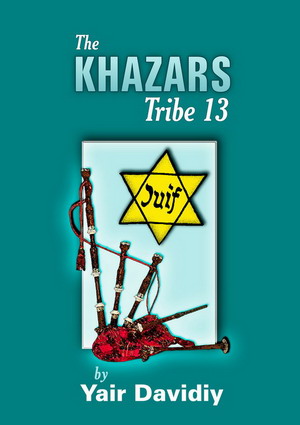The Khazars were NOT Turks! |
|
This Site |
Site Map Contents in Alphabetical Order |
|
Brit-Am Discussion Group |
Research Recognition Reconciliation | Contents by Subject |
The Khazars were NOT Turks!
For written article SCROLL DOWN/
| The Khazars were NOT Turks! Duration: 10.04 minutes |
|
The Khazars were Hebrews. The Khazars were not a Turkish group as is often claimed. Yair Davidiy from the Brit-Am Ten Tribes Movement explains why the Khazars were not Turkic. |
To hear a 18 minute .mp3 recording on the subject SCROLL DOWN/
The Khazars were NOT Turks!
Talk Prepared as part of the Brit-Am You Tube Introductory Course.
|
"The Khazars. Tribe 13" 
| The
Khazars
were not Turkish! [This is the first part of a two-part essay. The first part (i.e. this one) will explain why the Khazars were not Turkish. The second part will show how the Khazars were Israelites. The whole of our book "The Khazars. Tribe 13" deals in one way or other with this question. We are not summarizing the book but rather in these essays concentrating on what others (most of whom were more or less contemporary) said about them.] |
Were the Khazars Edomites and Turkish? or Turkish and Edomite? or Neither?
Some people claim that the Khazars were Turks and that the Turks are
Edomites and therefore so were the Khazars. They then say that the Jews are
mainly descended from Khazars and therefore the Jews are Edomites. This may
sound ridiculous but there are those who sincerely believe in it. Not all those
who hold these views are necessarily anti-Jewish. Some appear to be sincerely
mislead.
As for the Turks being Edomites more research needs to be carried out.
There may have been Edomite and Amalekite elements amongst Turkish peoples.
They can be very cruel and treacherous.
Nevertheless the indications are that they are not dominated by them though they
may be significant minorities amongst them.
Who are the Turks? What does it mean to
be Turkish, or Turkic?
The Turks originally were a group of peoples in Central Asia and the surrounding
region who spoke Turkish dialects. They are often identified with the Tartars.
These were a mixture of peoples who may originally have been white like Iranians
though some were red-haired and even blonds. They intermixed with different
Mongolian peoples who also adopted Turkish dialects.
Later these speakers of Turkish dialects conquered (1000s CE) from the Byzantine
Empire the region of Asia Minor (Anatolia) which is now known as Turkey. They
imposed the Turkish language on all the inhabitants. More than 85% of the
inhabitants of Turkey descend from the different peoples who lived there before
the "Turks" from Central Asia conquered them. It follows that most people in
Turkey are not really "Turkish" from an ethnic point of view, assuming that
"Turkish" has some ethnic meaning!
[ This may not
be exact. There are grounds to accept the proposal (put forward by others) that
the Turks who conquered Turkey in Ancient Times had originally emerged from
eastern Turkey, migrated to Central Asia where they received what became known
as the Turkish language and then returned. In ancient times the region of
eastern Turkey had been populated by a mixture of peoples including Hittites,
Edomites,
and Togarmah
son of Gomer
and brother to the Germans. In Assyrian inscriptions
Togarmah
is referred to as Tilgarmu
but the "l" and "r" sounds interchanged.]
Were the
Khazars
Turkish?
The Khazars in Central Asia may have spoken a Turkish dialect as did some
white "Nordic" peoples, some "Turkish" peoples and some "Mongolians".
It is not even certain however what language the Khazars really did speak since
all we have are a few "Runes" that appear like a Central Asian Turkish-related
dialect and MAY belong to the Khazars. At one stage the Turks did rule for a
period over the Khazars and they did dominate the region of Southern Russia. So
some influence was to be expected.
This does not say much and even this is uncertain. Some of the Khazars are
believed to have spoken a Finnish-type language. Avraham Polak ("Kuzaria",
Hebrew) believed their original tongue was a Gothic dialect. We think they
originally spoke Hebrew. The Khazars were actually reported of in southern
Russia long before the Turks were ever heard of.
The Khazars were not Turkish. They were Hebrews.
Why are the
Khazars
Considered Turkish?
Claim#
They are believed to have spoken a
Tukish
and had Turkish customs.
Answer:
This is not certain but if it is true it does not mean much since
in their time every group (including the Slavic-Viking Rus) in the area were
influenced by Turkish-speaking culture.
The Khazars lived in southern Russia with offshoots extending into Central Asia
(500s CE to ca.1200 CE, peaking from ca. 700 CE to 960CE). The Khazars were a
military minority of different federated tribes of warriors and semi-nomadic
herdsmen. At that times hundreds of different ethnic groups and tribes were in
the area. They were all fighting each other, allying with each other to fight
against others then breaking away to ally with someone else to fight the people
they were formerly allied with. They were also conquering each other, merging
together, dividing apart. Not only that but they switched their names around
after conquest or being conquered or as mark of prestige, eg. a lot of tribes
claimed to by Huns though they were not so but rather sought the status they
thought the term Hun implied.
In all this mixture and confusion the Khazars though few in number, were
prominent. They often ruled over many of the different peoples then they would
lose control, then get it back again, or share it with other groups etc. They
were also split up. Some Khazar groups were in the east bordering Mongolia and
some were in the west by the Caucasus and Crimea. The same applies to other
groups such as Alans, Huns, Turks, and Bulgars who were also split up.
All of the peoples in question were influenced by Turkish speakers and Turkish
dialect. In the same way as it is agreed that most of the other peoples were not
Turkish so too with the Khazars.
Claim#
Some Jewish (and non-Jewish) sources say
they were.
A letter from King Joseph of
Khazaria relates the
Khazar
to Togarmah
son of Gomer)
who is believed to have been the ancestor of the Turks.
Answer:
The letter from King Joseph is in several versions. It has been
doctored. The segment relating them to Togarmah appears from its style to be an
interpolation. The interpolation is similar to what we find in Yosiphon and
Sefer HaYashar (ca. 1200 CE) which are both forgeries from Italy or rather works
of popular entertainment based on a mixture of mythology and history and
imaginative fiction.
The Khazars were to be found in an area were speakers of Turkish dialects (such
as the Tartars) were known to exist so it was assumed that they were also
Turkish.
Petach of Ratisbon (1200s CE) travelled in southern Russia. He speaks of the
Khazars as Kings of Mesheck (one of the sons of Japhet son of Noah) but he also
mentions (in connection with them) the Mountains of Darkness and Jonadab son of
Receb both of which were associated in Jewish tradition with the Lost Ten
Tribes. He may be taking a connection between the Khazars and the Ten Tribes as
self-evident.
Some Iranian and Arab sources also link the Khazars with Japhet or Togarmah but
these may be based on the region the Khazars lived on.
The Persian Hudad al-Alam (982) said that Turkish Pecheneg Turks sold in Muslim
countries were called Khazars apparently because they came from an area
controlled by the Khazars and may have been sold by them.
The Khazars in Arab and Christian sources were also linked with Gog and Magog
but Gog and Magog were associated with the Ten Tribes. The Ten Tribes were
believed to be living in the lands of Gog and Magog.
Claim#
The ruling house of the Khazars is claimed to have been of Turkish origin and to
have ruled over Turks.
Answer:
The Ruling House of the Khazars (according to a Persian source) was known
as Ansa.
The ruling house of the Turks was the Asena. It is has been proposed that Ansa
and Asina are the same. They may be. We do not know.
More evidence is required.
The Ruling House of the Khazars was known as Ansa in Arabic and in another Arabic
source as Ayishai. Both these forms Ansa and Ayishai are considered the
equivalent as the Hebrew "Yishai" i.e. Jesse. The House of Jesse i.e. the
House of David.
In the region of Scythia, of the Khazars, many of the different peoples had
monarchs.
Different dynasties tended to intermarry with each other.
It was a bit like Europe and the Hapsburgs or Europe and the British House of
Windsor with the King of England being second cousin or closely related to the
Kaiser of Germany, the Tsar of Russia, the king of Greece, of Bulgaria, and
others.
It may be that somehow or other the ruling House of the Khazars had come to rule
over some of the Turks but this (if true, and we do not know) would not mean
that the Khazars were Turkish. The same ruling house that may have ruled over
the Khazars and Turks also seems to have possibly ruled over part of the Huns,
the Goths, and the Parthians. The deeper we go into these matters the more
remote the possibility of Turkish connections become.
Why Should the
Khazars
NOT be Considered Turkish?
Answer:
Most contemporary Jewish sources relate the Khazars to Israel. Sources that
relate them to Togarmah are mainly later ones and less reliable. Those who knew
them at first hand considered them Israelite.
Modern Theories:
Abraham Polak believed the Khazars were Goths.
Vladimir Pomakov said they were Scythians and Slavs descended from the ancient
Cimmerians and Massagetae.
There is little evidence of Turkish input. All that there was can easily be
explained by cultural contact.
The Khazars themselves said they were of Israelite descent.
The evidence shows that the Khazars should be believed. They were
of Israelite Descent.
See our next article in this series.
See also:
The Khazars, Manasseh, and the USA.
The Khazars were part of the Lost Tribes.
See also:
The Khazars and Scotts: List of Articles on the Khazars.
|
Index |
The Khazars were NOT Turks! |
next |
Pleased with what you read?
Through helping us, God willing, you will bring a blessing on yourselves and on others.
Click Here to make an offering. |
 |
